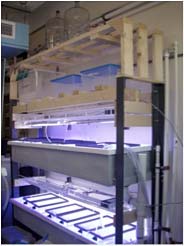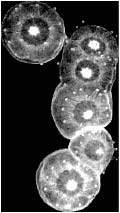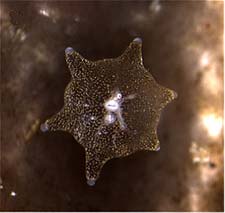In conjunction with the projected increases in CO2 of the coming century, adult coral growth and calcification are expected to decrease significantly. Little is known about how the early life stages of corals will be affected by high CO2. In collaboration with the Mote Marine Laboratory, this study seeks to improve the understanding of how elevated CO2 may impact the ability of corals to produce new colonies by sexual reproduction. Presently, the study is focusing on the early post settlement growth of juvenile Porites astreoides and Montastrae faveolata with plans to extend this work to Acropora cervicornis.
Larvae and gametes of the corals are collected from reefs in Key Largo, Florida and fertilized larvae are settled and reared in controlled saturation state seawater. The objective is to find out how larvae could grow and develop under such conditions.

Fig. 1 Experimental set up for raising juvenile coral colonies under controlled temperature and CO2 conditions. |

|
 |
| Fig. 2 Micrographs of coral juveniles shortly after settlement on the preconditioned tiles. |






